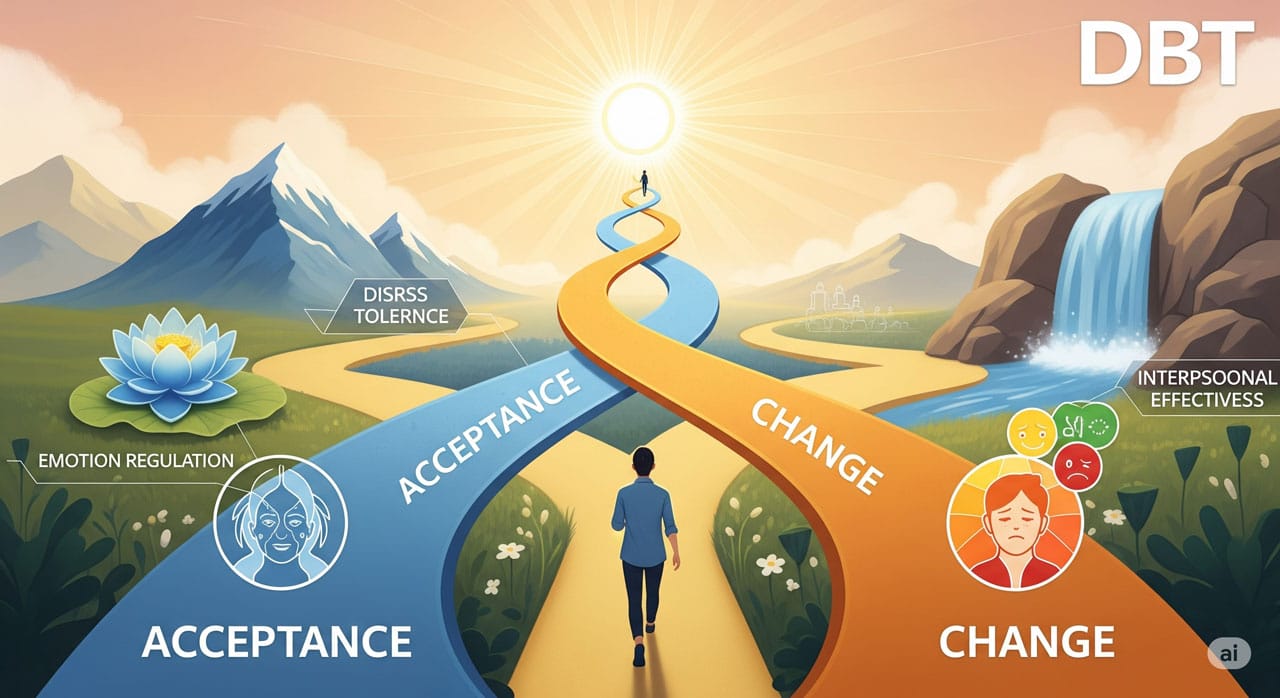
The DBT Dialectical Behavior Therapy Journey: Balancing Acceptance and Change for a Richer Life

Life can sometimes feel like navigating a stormy sea, with waves of intense emotions threatening to capsize us at any moment. For those who experience emotions with exceptional intensity, where feelings are overwhelming, relationships feel chaotic, and behaviors seem beyond control, there’s a therapeutic approach that offers not just a lifeline, but a compass and a sturdy vessel: DBT Dialectical Behavior Therapy.
Dialectical Behavior Therapy (DBT) is a comprehensive, evidence-based psychotherapy that grew out of a deep understanding of human suffering and the desire to provide effective tools for profound change. Developed by Dr. Marsha Linehan, it was initially designed to help individuals struggling with chronic suicidal ideation and Borderline Personality Disorder (BPD), conditions characterized by severe emotional dysregulation. However, its powerful blend of acceptance and change strategies has proven beneficial for a much wider range of challenges, offering hope and practical skills to build a life worth living.
At its heart, DBT embraces a fundamental “dialectical” principle: the idea that two seemingly opposite truths can coexist. In the context of therapy, this means accepting yourself exactly as you are, with all your struggles and imperfections, while simultaneously working towards changing the behaviors and patterns that cause distress. It’s a delicate, compassionate balance that acknowledges pain while empowering growth.
What is DBT Dialectical Behavior Therapy? The Core Philosophy
The “dialectical” aspect of DBT is key to understanding its unique power. It moves beyond the often-frustrating dichotomy of “either/or” thinking (“I’m either completely well or completely broken”) to embrace “both/and” (“I am doing the best I can and I need to try harder”). This non-judgmental stance fosters self-compassion and reduces the intense pressure that often accompanies the struggle with emotional and behavioral challenges.
Traditional cognitive behavioral therapy (CBT) often focuses primarily on changing thoughts and behaviors. DBT expands on this by integrating elements of mindfulness and radical acceptance, derived from Eastern meditative practices. This unique synthesis creates a therapy that not only teaches practical skills for managing difficult situations but also cultivates a deeper, more accepting relationship with oneself.
The overarching goal of DBT Dialectical Behavior Therapy is to help individuals create a life that feels meaningful and worth living, even amidst ongoing challenges. This is achieved by targeting problematic behaviors (such as self-harm, suicidal ideation, substance abuse, or chaotic relationships) and replacing them with more adaptive, skillful responses.
The Four Pillars of DBT: Essential Skill Modules
DBT is structured around four core skill modules, typically taught in a group setting (skills training group) in conjunction with individual therapy, phone coaching, and a therapist consultation team. These modules provide a comprehensive toolkit for navigating life’s complexities:
Mindfulness: Grounding in the Present
Mindfulness is the foundational skill in DBT. It teaches you to be fully present in the moment, observing your thoughts, feelings, and sensations without judgment. This is not about emptying your mind or achieving a state of bliss, but rather about learning to pay attention, on purpose, to the “here and now.”
Skills within the mindfulness module include:
“What” skills: Observing (just noticing), Describing (putting words to your experience), and Participating (fully engaging in the moment).
“How” skills: Non-judgmentally (avoiding labeling as good or bad), One-mindfully (focusing on one thing at a time), and Effectively (doing what works to achieve your goals).
By practicing mindfulness, individuals learn to step back from overwhelming emotions and observe them as temporary phenomena, rather than being swept away. This creates space for thoughtful responses instead of impulsive reactions, fostering a sense of inner calm and clarity.
Distress Tolerance: Riding the Wave of Crisis
Distress tolerance skills are designed to help you get through intense emotional pain without making things worse. They are crisis survival skills, meant to be used when you cannot immediately solve a problem or change a difficult situation. The goal is to tolerate the moment of crisis, much like riding a wave until it passes.
Key distress tolerance skills include:
Distraction: Engaging in activities that temporarily shift focus from intense pain (e.g., ACCEPTS: Activities, Contributing, Comparisons, Emotions, Pushing away, Thoughts, Sensations).
Self-soothing: Comforting yourself through your five senses (e.g., listening to calming music, taking a warm bath, eating a favorite food mindfully).
Improving the Moment: Short-term strategies to make a distressing situation more bearable (e.g., IM PROVE: Imagery, Meaning, Prayer, Relaxation, One thing in the moment, Vacation, Encouragement).
Radical Acceptance: A deep and complete acceptance of reality as it is, even if it’s painful, without judgment or resistance. This is not approval, but a recognition of what is, which can reduce suffering.
These skills are vital for individuals who often resort to self-harm, substance abuse, or other destructive behaviors to cope with overwhelming emotions. They provide healthier alternatives for surviving crises until more effective problem-solving can occur.
Emotion Regulation: Understanding and Managing Your Feelings
Emotion regulation skills focus on understanding, experiencing, and changing emotions in a healthy way. This module teaches you how to identify emotions, understand their functions, and reduce their intensity and frequency, particularly those that are painful or problematic.
Skills in emotion regulation include:
Checking the Facts: Objectively examining whether your emotional reaction fits the situation or if it’s based on distorted thinking.
Opposite Action: Acting in a way that is opposite to the urge of a dysfunctional emotion. For example, if anger makes you want to attack, opposite action might involve gentleness or avoidance. If sadness makes you want to isolate, opposite action is engaging with others.
Reducing Emotional Vulnerability (PLEASE skills): Taking care of your physical body to reduce susceptibility to negative emotions (e.g., [P]hysical illness, [L]ife-balancing, [E]ating healthy, [A]void mood-altering drugs, [S]leep well, [E]xercise).
Building Mastery: Engaging in activities that make you feel competent and successful, which can boost positive emotions and self-esteem.
By applying these skills, individuals learn to become more aware of their emotional triggers and responses, gaining greater control over their emotional experiences rather than being controlled by them.
Interpersonal Effectiveness: Navigating Relationships Skillfully
Interpersonal effectiveness skills teach you how to ask for what you need, say no, and maintain your self-respect and relationships. Many individuals struggling with emotional dysregulation also experience chaotic and unstable relationships, often due to difficulties in communication, setting boundaries, or asserting their needs.
Skills in this module cover:
Objective Effectiveness (DEAR MAN): How to effectively ask for what you want or say no, while preserving your relationships and self-respect (Describe, Express, Assert, Reinforce, (be) Mindful, Appear Confident, Negotiate).
Relationship Effectiveness (GIVE): How to keep and improve relationships (Gentle, Interested, Validate, Easy manner).
Self-Respect Effectiveness (FAST): How to maintain your self-respect (Fair, Apologies (no excessive), Stick to values, Truthful).
These skills empower individuals to communicate more clearly, resolve conflicts constructively, and build healthier, more stable relationships. They help in balancing priorities: achieving objectives, maintaining relationships, and preserving self-respect.
Who Can Benefit from DBT? More Than Just One Condition
While DBT Dialectical Behavior Therapy was originally developed for individuals with Borderline Personality Disorder (BPD), its effectiveness has led to its adaptation for a wide range of conditions characterized by emotional dysregulation and impulsive behaviors. This widespread utility highlights that the skills taught in DBT are universally helpful for anyone seeking to better manage their emotions and improve their lives.
Beyond BPD, DBT is highly effective for:
Chronic Suicidal Ideation and Self-Harm: Providing alternative coping strategies and reducing the urge to engage in self-destructive behaviors.
Eating Disorders: Particularly bulimia nervosa and binge eating disorder, by addressing emotional eating and developing distress tolerance for urges.
Substance Use Disorders: Helping individuals manage cravings and avoid relapse by teaching emotion regulation and distress tolerance skills.
Depression and Anxiety Disorders: Especially when these conditions are accompanied by intense emotional swings, impulsivity, or significant interpersonal difficulties.
Post-Traumatic Stress Disorder (PTSD): DBT can be an effective component of PTSD treatment, particularly after initial safety and stability have been established, as it helps regulate the intense emotional reactions associated with trauma.
Bipolar Disorder: For managing mood swings and impulsive behaviors.
Anger Management Issues: By teaching emotion regulation and interpersonal effectiveness.
The core reason for DBT’s broad applicability is its focus on building a comprehensive set of life skills. These are skills that many people may not have learned in their developmental years, leaving them vulnerable to intense emotional experiences and maladaptive coping.
What to Expect in DBT: A Comprehensive Approach
A full DBT program is multi-modal, meaning it involves several components working together to maximize effectiveness. This comprehensive structure is a hallmark of DBT and is crucial for achieving lasting change:
Individual Therapy: Weekly one-on-one sessions with a DBT therapist. These sessions focus on applying the skills learned in group to your specific life challenges, addressing target behaviors, and maintaining motivation.
Skills Training Group: Typically a weekly group session, led by one or two trained therapists, where you learn and practice the four core skill modules (Mindfulness, Distress Tolerance, Emotion Regulation, Interpersonal Effectiveness). This often functions like a class, with handouts, exercises, and homework.
Phone Coaching: Brief, in-the-moment phone calls with your individual therapist to help you generalize skills into real-life situations. This immediate support helps prevent problematic behaviors and reinforces skillful responses.
Therapist Consultation Team: The therapists providing DBT to clients meet regularly (usually weekly) as a team. This ensures therapist adherence to the model, provides support, and helps prevent therapist burnout, ultimately benefiting the client.
This multi-faceted approach ensures that individuals receive consistent support, learn practical skills, and have opportunities to apply them in real-time. The structured nature of DBT provides a sense of predictability and safety, which is especially important for those who have experienced chaotic environments.
DBT in Practice: Embracing the Dialectic
Engaging in DBT Dialectical Behavior Therapy is a commitment to a process of deep personal growth. It’s not always easy; it requires effort, practice, and a willingness to confront difficult emotions. However, the rewards are immense.
Imagine being able to experience intense emotions without being consumed by them. Imagine having the tools to navigate challenging conversations with grace and assertiveness. Imagine feeling grounded in the present moment, even when life feels chaotic. This is the promise of DBT.
The core dialectical tension—accepting yourself as you are while simultaneously working to change—can feel paradoxical at first. But it’s precisely this tension that fuels transformation. Acceptance provides a foundation of self-compassion, reducing self-blame and allowing you to see yourself more clearly. Change provides the pathway to a more fulfilling and stable life, equipping you with the skills to build the life you truly want.
The journey with DBT is one of learning to validate your experiences while also challenging unhelpful patterns. It teaches you that your emotions, no matter how intense, serve a purpose, and that you can learn to respond to them skillfully rather than react impulsively. It’s about building a “life worth living”—a life characterized by reduced suffering, increased joy, and stable, meaningful relationships.
If you find yourself overwhelmed by emotions, struggling with impulsive behaviors, or constantly navigating relationship turmoil, Dialectical Behavior Therapy offers a structured, compassionate, and highly effective path forward. It’s an invitation to learn the skills necessary to navigate life’s storms, find your inner balance, and ultimately, build the life you’ve always hoped for.
Schedule a free 15-minute call to see if we are a good fit.

Contact Us

